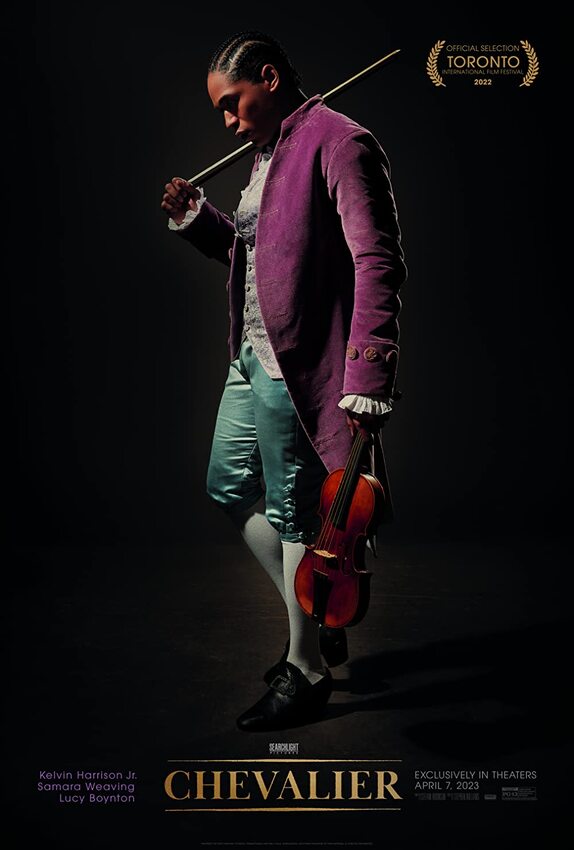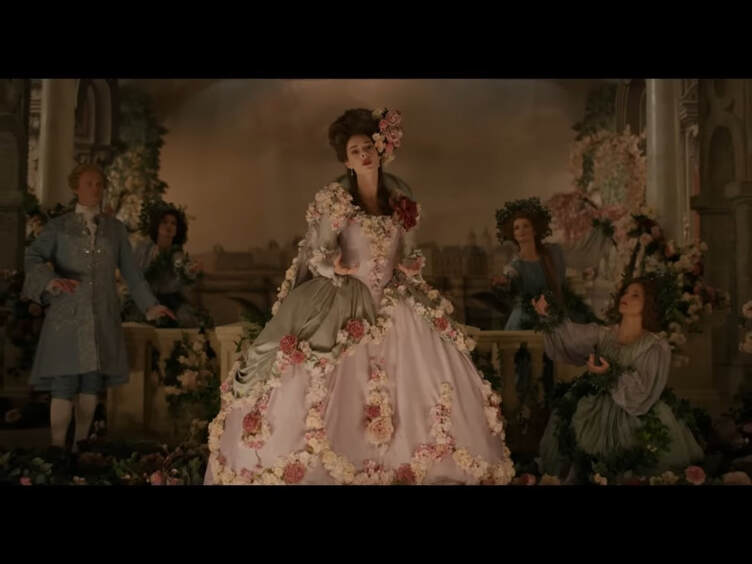|
Chevalier the Film in Review by JeanCaleb Belizaire & Ashleigh Gordon
(Achtung! Spoiler alerts ahead…) What was the vibe of the room? - JeanCaleb On Wednesday April 19th, I had the pleasure to see Chevalier at the Coolidge Corner Theatre. The Theatre had a very old-timey, vintage vibe to it which I enjoyed. There was a string quartet playing Chevalier’s music as people were walking in, this sort of set the tone for what we were about to watch. Someone behind me even mentioned that this is most likely how the music would have been received back then, musicians playing while the audience mingled. I saw people from all walks of life in the audience, the majority being a mix of older white people and adult black people. Was the movie historically accurate? - Ashleigh Not entirely (which is understandable as it’s not billed as a documentary). Did I mind? Not really as I could understand the narrative reasons for the historical revisioning. While an epic musical sparring battle between Mozart and Chevalier didn’t really happen, Chevalier did champion the sinfonia concertante, a concerto featuring two soloists and orchestra. (Fun fact: Chevalier wrote eight of these kinds of works between 1775 and 1778 to Mozart’s one composed in 1779. They were so notable that Mozart copied a musical passage from one of Chevalier’s scores, hiding his thievery only through a half-step transposition). The prelude scene also gave a nod to the diminutive historical narrative placed on Chevalier as being a Black “second fiddle” to Mozart’s dominance. In the end, Chevalier’s skills speak for themselves and place him defiantly in a category all his own. Another revisionist element that became a central aspect of the plot was his relationship with his mother Nanon. A Senegalese woman enslaved by the white plantation owner George Bolonge, Nanon was brought to France in 1753 along with Chevalier (and George’s wife and legitimate child). While the movie chose to dramatize their separation, I could fully understand the narrative reasons for doing so. As Nanon ultimately represented the African cultural roots, language, and traditions that we (the audience) could tangibly see, it made sense to represent Chevalier’s removal from those roots with an actual forced, physical separation. Nanon became a voice of reason - an ancestral reminder - that grew louder in Chevalier’s mind, helping him to see the dichotomy in which he exists: a Black dot in a white space. So whatcha think? - JeanCaleb Overall, I loved the movie. It explores many themes that I can personally relate to; for example, the movie touches on W.E.B. Dubois’ double consciousness, the idea of being Black in a white dominated world or space, having to constantly code switch and feel like you can never really be your authentic self is something that me and so many other black people in America can relate to. One interesting example of this is when Chevalier’s mother and friends were speaking their language in Chevalier’s house, you can tell how uncomfortable he is by this and tell them that French is the preferred language. To me, I feel like his reaction comes from a place of insecurity, he doesn't really feel connected to his mother who represents his roots and his people. Showing how isolated he might’ve felt throughout his life. Feeling like he doesnt belong with his own people, or French people. Another aspect I enjoyed was this nursery song Chevalier’s mother sang to him as a child. She brings it up again later on when she moves back in with him, asking him to play it for her and how it would be a great addition to his opera. He denies this idea, he denies his past, his heritage. Later on in the movie towards the end in the Last scene, we hear that same melody incorporated into Chevalier’s composition. Symbolizing how he has come to terms with his heritage and background and learns to embrace it in everything he does. Any takeaways? - Ashleigh I was elated in the final moments before the credits when they relayed Chevalier’s legacy. How racism and the power struggle that drives slave systems overshadowed his lasting impact. While France would abolish slavery in 1794 (five years before Chevalier died), Napoleon would reinstate the harsh system of Code Noir in French Colonies in 1802 (three years after Chevalier died and during the Haitian Revolution, which was fought between 1791 and 1804). Napoleon would intentionally ban his music, effectively wiping his pioneering sinfonia concertantes, violin concerti, symphonies, sonatas, operas, etc from stages and history books for centuries. It would be about 130 years after his death before a string quartet by a Black composer - the late 19th century born African American composer and violinist Clarence Cameron White - would have a string quartet performed in Paris (one that ironically was unabashedly inspired by Negro melodies). What drives this point home even further was that Chevalier was pivotal in bringing the medium of string quartet writing to France during his lifetime. Its popularity to French audiences was a result of his work. Through power, intentional erasure, and racism, Chevalier’s prolific voice and fullest potential were stunted. With optimism, we have the ability to ensure that history will not repeat (or rhyme) and let a similar fate of forced amnesia befall yet another Black mind.
2 Comments
Manish Tomar
6/3/2023 09:21:24 pm
I appreciate the practical tips and actionable advice you've shared in your post. They make it easy to implement the recommendations. <a href="https://I found your blog post to be thought-provoking and informative. I appreciated the way you presented the information and the connections you made to real-life examples. To gain further insights, click here." target="_blank">click here</a> for more information.
Reply
Jessica
9/17/2023 11:20:34 pm
If you want to save huge? 😍 Then this is the best place for you where you can enjoy the best deals and coupons <a href=" https://coupondonor.com/coupons/adulttime ">Watch now</a>
Reply
Leave a Reply. |
Details
Writings, musings, photos, links, and videos about Black Artistry of ALL varieties!
Feel free to drop a comment or suggestion for posts! Archives
May 2024
|
Member Login
Black concert series and educational programs in Boston and beyond



 RSS Feed
RSS Feed










